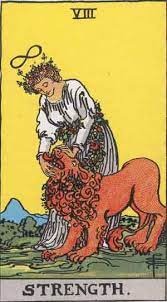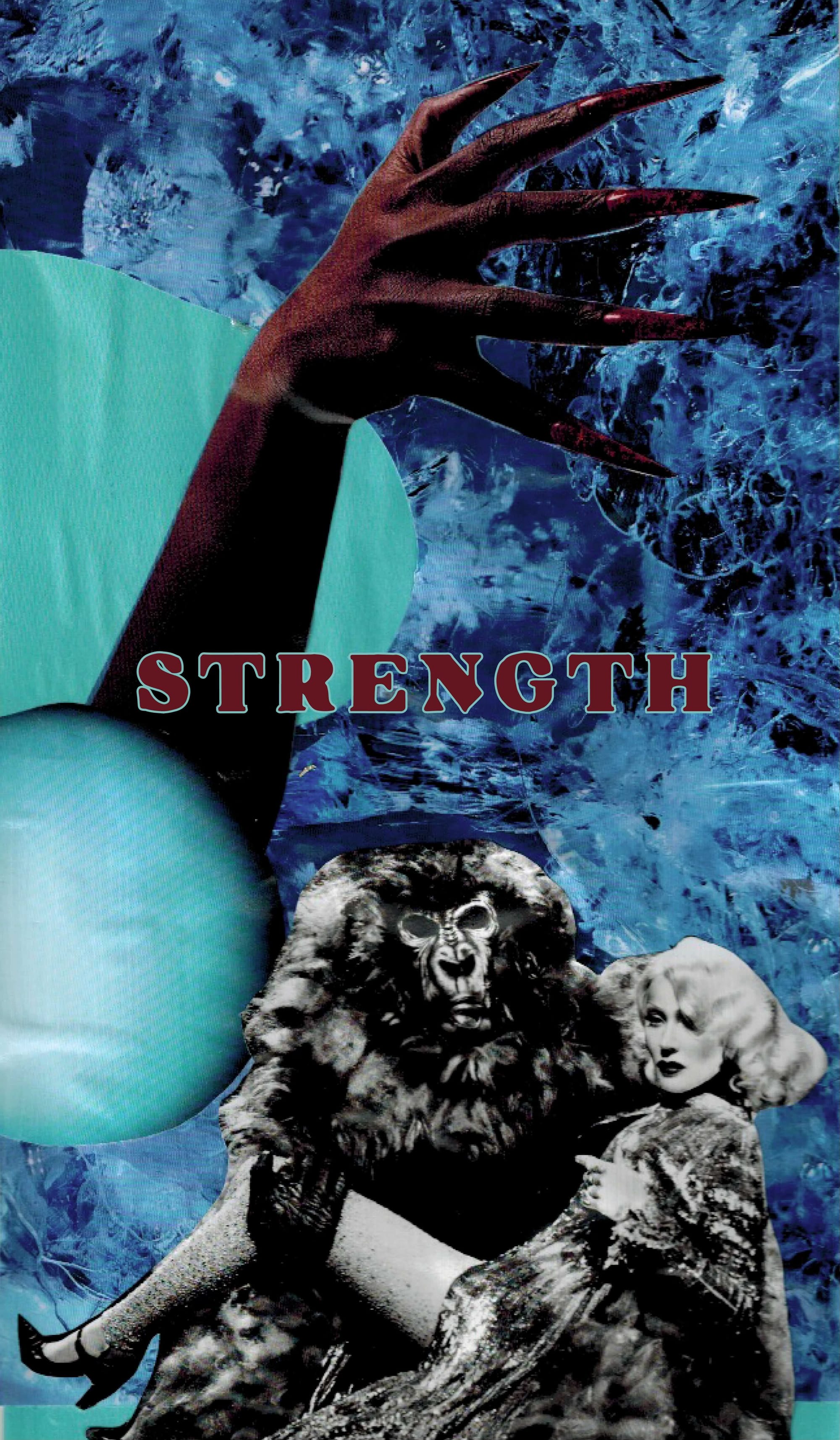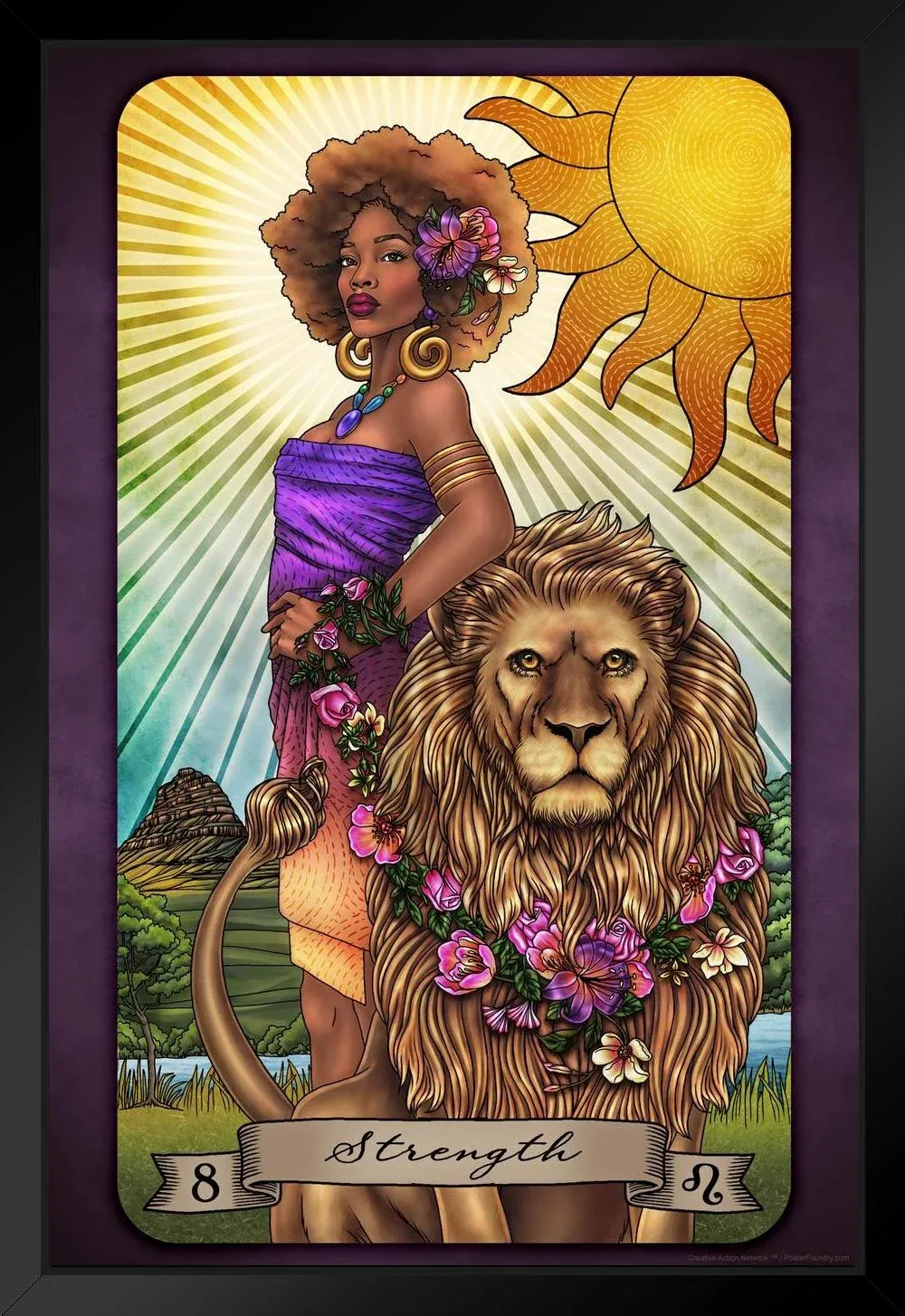Strength
Raising children in a world that constantly reenforces the idea that strength is brutality, control, and power, is a Sisyphean task. Brutality is not leadership, control is an illusion, power can be taken away.

“This card signifies bravery in the face of adversity. Yet there is no coercion here, instead, inner strength is utilized to rise above difficulties and subdue aggression. Compassion and patience hold the key to attaining power and overcoming obstacles. The Strength card celebrates fortitude in times of distress or danger. It reminds one to remain calm even amid intense struggle. Strength asks for the distillation of goals and desires and a renewed focus on core needs. It calls for reliance on both the vigor of the body and centeredness of mind to endure trial and tribulation. Situations can be best controlled by serenity and persistence. Stamina must be matched by stillness, commitment, balanced by composure. Trust both instinct and raw emotion, but tame these with constructive action and steady perseverance.”
- The Library of Esoterica Tarot, written and edited by Jessica Hundley
“If I grow up and become a hunter, can I have a flamethrower?” my son asks me this morning before school. He’s wearing size T5 jeans with an elastic waistband, a belt slung over the top of the elastic, and a sleeveless vest that I bought him for his fourth birthday (all he wanted that year was “rock star clothes”). His hair, which up until a few days ago, was shaggy and perpetually in his eyes has recently been trimmed to look more like River Phoenix as a young Indiana Jones. He has a stuffed seal named "Nighttime Judy," he tells me he wants to live with me forever, and most nights he still ends up sandwiched between my husband and I in our bed. This is the angelic person standing before me desirous of a flamethrower?!?!? This little cherub wants to grow up and BECOME A HUNTER?
I’ve heard it said that boys’ brains do not develop fully until they are twenty-five years old. That until 25, their pre-frontal cortex does not fully compute consequences. This argument has been used against the prison industrial complex, and listen, I'm all for whatever logic it takes to stop locking people up in a for-profit system that has no desire to help them. At the same time, it's important to say that there is a TON of scientific research proving that the notion of a "gendered brain" is bullshit.
Human brains are complex and malleable. The human obsession with categories, particularly binary ones, is probably something we should keep a fucking eye on, considering it's this obsession that gave us eugenics. I recommend reading Gina Rippon's book The Gendered Brain: The New Neuroscience That Shatters The Myth of the Female Brain, a book that systematically debunks the studies that set out to illustrate the differences between male and female brains. Women are not "better at multi-tasking," nor are men "better at math," women are not "more nurturing," nor are men "more violent," because of some inherent difference in their brains. The same can be said of hormones. All bodies contain testosterone and estrogen, and the presence of testosterone, for example, does not determine a predilection for violence. Culture and society creates these expectations and norms, and the way we raise children, and treat people differently according to their gender, certainly does create this disparity, but it's not determined by chromosomes.
As Ru Paul says, "We're all born naked and the rest is drag." Gender is a construct, created by people, and it is different throughout the world, depending on the cultural norms and traditions of the people experiencing and practicing it. But just because gender is a construct, doesn't mean it doesn't exist. Gender is a powerful agent of containment and control. Our children receive gendered messages all day every day from every corner of their lives.
"I didn't cry!" T reports happily about an incident when he fell from the monkey bars. "It's okay to cry!" I tell him. He looks at me, annoyed. He's heard that before, but he's proud of himself for sucking it up. "I cry all the time!" I say, and he looks at me like yeah, I know. "Daddy cries all the time!" I try, though it isn't quite true. I make a note to tell my husband to cry more in front of our kids.
No matter how hard we try to parent our children according to intuition, love, and principles, rather than gender norms, like all systems of oppression, patriarchy already has a heavy foot in the door. It's in the air we breathe, so I can't rely solely on instinct to protect my kids from my own subconscious gender biases. My son is obsessed with strength and bravery, and of course he is. He is bombarded with messages about the connection between masculinity and strength – television, movies, classmates, friends, the playground, well-intentioned and shitty grown-ups alike, and probably, frankly, from his father and me, though we make every effort not to.

The Strength card often depicts a woman delicately stroking the head of a lion. The beast represents ferocity and danger. But the woman is gentle, coaxing. The Strength of this card is quiet and persuasive. The woman does not bend the beast to her will. She gently guides him in the direction she wants him to go. She is strong, firm, courageous. She is not afraid. You might say that girls are taught that strength is the woman and boys are taught that strength is the lion.
In fifth grade, I was ten years old. My classroom was, for the first time, upstairs, and my teacher was, for the first time, a man. This was also the year that a fire was lit under my OCD. All day every day I compulsively obsessed about kindness. In some dark corner of my heart, I felt impure, secretly evil. Any time I had an unkind thought (which could honestly have looked like a simple preference – "I'd rather have a play date with X than Y"), I would berate myself and lie awake at night performing rituals to purify my evil brain.
In fifth grade, I also had a classmate, a boy, who was out of control. I'm not sure what kind of diagnosis he would get today – perhaps ADHD or ODD (oppositional defiant disorder) – or what kind of hard time he was having at home. Even now, do you see me creating excuses on behalf of the boy?
It was widely known by my classmates that I had a thing about kindness, and it was often used against me. This boy, let's call him Peter (not his name), was fixated on me. When our teacher wasn't looking, he'd stand over my desk, hulking over me, daring me to tell on him. He'd gyrate his hips back and forth, humping my desk, sending my Trapper Keeper flying. Sometimes he would sing, changing the lyrics of top 40 songs to inappropriate, sexual fantasies about what he would do to me.
I want to remind you: I'm ten years old in this story.
This boy would bring things to school that he had clearly stolen, sometimes from his sister, and other times with the tags still on – a necklace, for example, or brass turtle earrings. He would give them to me and say, "If you don't wear them, you're mean." And so, I would wear them, enduring the ridicule from the rest of our classmates who would see the jewelry as evidence that Peter and I were an item, that I was his property, in spite of the fact that every time he came within two feet of me, all the hair on the back of my neck stood up.
This kid clearly had some issues. But nobody came to my rescue. I don't think I told my parents what was going on with Peter. I kept the darkest parts to myself, more internal suffering to make me feel like I was a good person. But plenty of adults told me, "Aw, he has a crush on you," to explain behavior that made me feel sick to my stomach. No teachers came to my defense. And because I was kind to this boy, when very few others were, I was often placed in his reading group, or had my desk situated beside his. He was the problem and I was the solution, which I think is maybe a metaphor, huh?
That same year, I was given a school-district wide award, "The Superintendent's Citizenship Award." At the ceremony, my kindness was touted as extraordinary, which, of course, it was. How could it not be? I spent all night awake, hyper-vigilantly policing my mind, blurring any boundary I could find within myself that could have protected me from Peter.
I was given the message that I was strong. I was a strong girl for being kind to this boy even though others were not. I was a strong girl for being brave enough to endure his harassment, for wearing the jewelry he stole for me even though I knew it would make me the object of ridicule from my classmates. He was a strong boy because he was defiant. In a fit of rage one day, he threw his rollerblades down the stairs to show our teacher just how angry he was. He raged and acted out and was rewarded with a seat beside the compliant girl who was always kind to him.
How often have we used the word "strong" about a woman (particularly women of color) when what we are actually talking about is her ability to endure bullshit or worse? How often are men described as "strong" when what we are actually talking about is his ability to control, steamroll, and force his will on others?
Raising children in a world that constantly reenforces the idea that strength is brutality, control, and power, is a Sisyphean task. Brutality is not leadership, control is an illusion, power can be taken away. Real strength is persuasion. Real strength is fortitude, moral clarity, standing up for what’s right. Real strength is also boundaries, making and keeping them, acknowledging and respecting them, in spite of social pressure to bend and break.
I will never tell my son that strength means pushing past someone's boundaries, just as I will never tell him that it's more important to be kind than safe. The same goes for my daughter.
My little boy is sensitive, generous, funny. For Valentine’s Day this year, I gave him a necklace, an unpolished Tiger’s Eye crystal on a string the width of a shoelace that I bought in a bookstore in Pasadena near my office. The packaging said the crystal would bring “strength, confidence, and bravery.” He wears it religiously, including to sleep, even though it seems uncomfortable to roll over onto a rock. But he's insistent, and believes fully in its powers. He feels the necklace working, he tells me. He feels brave and strong.
What does it mean to be five and to be brave? What does it mean to be five and be strong? By all accounts, though he can traverse the monkey bars, he is not strong. He is five. He is vulnerable and small, growing fast but in many ways still a baby. Perhaps the obsession with strength is a kind of overcompensation, a way to convince himself he has power in the world, even though he has a bedtime, and is frequently asked to do things he doesn’t want to do. Perhaps when he imagines himself strong it makes him feel bigger, or it quiets his fears. It may be that very same impulse that leads so many adults astray.
I hope to teach my children that Strength is both the woman and the lion. Together, they marry logic and empathy, willpower, confidence, and brawn. The woman uses persuasion and kindness, gentle words and logic, to coax the beast to her point of view. The lion's strength does not come from its muscled lethality, but from its willingness to be persuaded.
Now, excuse me, while I go try to make my husband cry in front our children.



Are you guys listening to the playlists? I can't tell! I make them for every single card, and they are fun! Leave me a comment here – help me think of more songs to add! If you're a person who loves Tarot, or is interested in learning Tarot, these playlists are another great way to get into the spirit of the card.
Recommendations!
The Gendered Brain: the new neuroscience that shatters the myth of the female brain by Gina Rippon – This book is fascinating and scientific (though accessible!). If you want to hear her arguments distilled, I recommend reading this article and this one.
Man Alive: A True Story of Violence, Forgiveness, and Becoming A Man by Thomas Page McBee. A beautifully written memoir by an excellent writer. Thomas Page McBee grapples with masculinity and identity, on the precipice of transition. I devoured this book, and highly recommend it.
The Will To Change: Men, Masculinity, and Love by bell hooks. This book was published in 2004, and some of the language in it is binary in a way that was pervasive twenty years ago. At the same time, bell hooks is an incredible writer and thinker, who continued to evolve her thinking about gender for as long as she lived. In this book, bell hooks writes about the construct of masculinity, and the system of patriarchy – how all of us, no matter our gender, participate in creating this system, and what we might do to change that.
Freedom of Sex: the moral case for letting trans kids change their bodies by Andrea Long Chu. This recent article in New York Magazine is a must read, according to me. In an election year where trans people are being cravenly vilified, and trans kids have become a cudgel, please don't be the kind of Bill Maher liberal who plays right into the evil bullshit of bigots like Donald Trump, mkay? You're not "just asking questions," if you aren't changing your mind when you receive the answers.
Are Men Animals? How Modern Masculinity Sells Men Short by Matthew Gutmann. Caveat: I haven't finished this yet, but I'm in the process of reading it. Gutmann is an anthropologist, and the book is essentially organized around the idea that "boys will be boys" is a deeply harmful cultural belief that is completely divorced from science and data. The book illustrates how different masculinity is across cultures, and argues that because sex differences are overblown and unscientific, our culture's obsession with the link between men and violence, for example, is a self-fulfilling prophecy.
